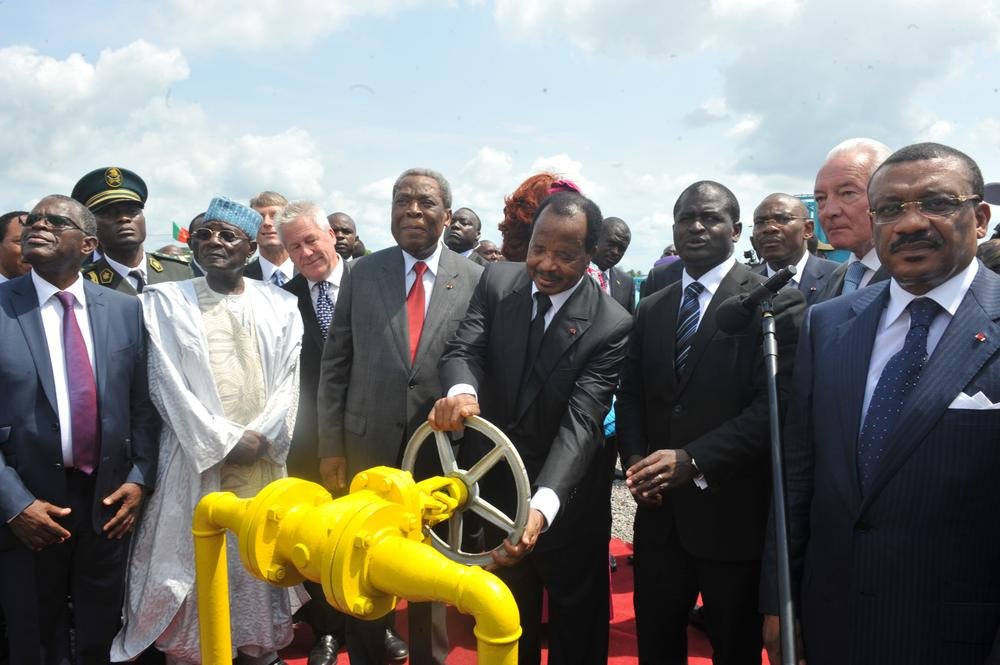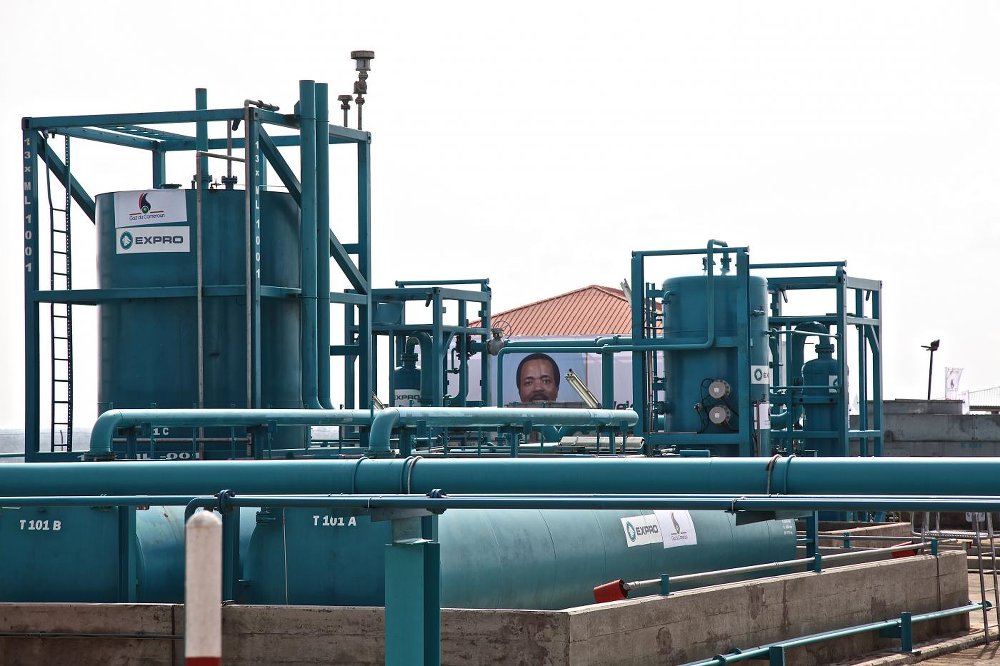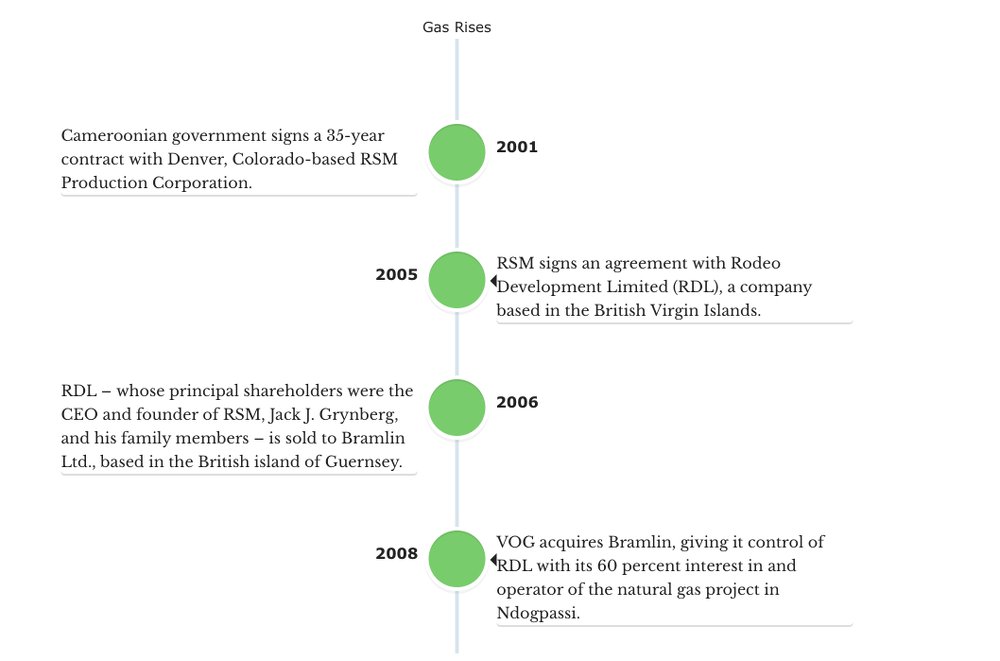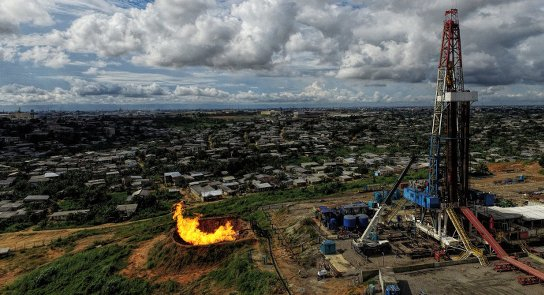Royalties for shareholders, tainted water for the locals
Cameroon’s Gaz du Cameroun and its UK multinational partner fill the pockets of those aligned with kleptocrat ruler Paul Biya whilst an elite military unit oppresses popular protests.
As the first rays of daylight pierced a thick haze blanketing the Ndogpassi neighborhood, several dozen angry men appeared, seemingly from nowhere. They formed a human barrier across the main entrance to a natural gas power plant in the east of Douala, Cameroon’s economic capital. Some of the men laid across the roadway, forcing employees of the plant to abandon their cars and enter the facility on foot. As daylight emerged and a crowd of onlookers grew, the men began to sing Cameroon’s national anthem.
That episode, in the summer of 2016, signaled the start of a long protest against Gaz du Cameroun (GDC), an organisation that is actually owned by the British Victoria Oil and Gas Plc (VOG), based in London. Accusations of corruption, payoffs to public officials, and lying to the community about the start-up and operation of this important power plant, fueled the protest.
The principal complaint: the promise of a substantial number of permanent jobs for local residents has gone unmet.
The community is plagued by a foul odor from the drinking water
“GDC says that local residents aren’t qualified. Yet, at the same time, the company is training people from outside, hiring them and refusing to do the same for us,” said a protestor in the crowd. He wouldn’t give his name to a stranger, citing fear of reprisals from the security forces. “Only two people from the neighborhood, out of forty, have been hired by GDC for the new drilling operations.”
To cut the tension, authorities brokered a meeting between the disgruntled residents and company officials.
A month later another group of residents took to the streets, protesting that the company brought on local youth only as temporary hires, and groundskeepers. Today the community is overwhelmed by youth unemployment and plagued by a foul odor from the drinking water, damage to the local environment and brutal police retaliation when they speak out.
The project yielded millions of dollars to investors but failed to pay tax
Local complaints and accusations of broken promises to the community have not prevented gas-industry analysts from heaping praise on VOG’s Cameroonian affiliate. The Petroleum Economist, the prestigious London-based trade publication, lauded VOG’s management of Cameroon’s natural gas production facility as exemplary. Upon receiving the “Energy Company – Small cap of the Year” award for 2015, Kevin Foo, founder and executive director of VOG, said the prize was testimony to the dedication and hard work of the teams in Douala and in London. And indeed, when Cameroonian President Paul Biya first launched the project in 2013, residents of Ndogpassi welcomed the gas plant as a ticket out of poverty.
A two-year investigation by 100Reporters has found that the project, though managed by President Biya, has failed to pay royalties, training fees and taxes to the Cameroonian treasury, even as it made payments to investors totaling millions of dollars.
Now, after years of silence, the Cameroonian government admits the plant’s owners have missed tax payments to the Cameroon treasury, and has identified possible violations of resource, Social Security and environmental rules. In March, it threatened to terminate the contract with the VOG subsidiary that runs the plant. Executives for the company and its various international subsidiaries declined to comment about the government’s accusations.

Gas to the Rescue
Before the construction of this power plant, which covers some 20 square miles, industrial and business users in Douala burned heavy and expensive fuel oil. And these users had to deal with regular supply interruptions that hurt production. Natural gas was seen as the solution: clean, reliable and less expensive, especially for businesses with their own generators.
Two exploratory wells in Ndogpassi yielded enough proven reserves to satisfy consumption needs in the region through 2043.
“Energy is at the heart of any development process,” Biya said in November 2013. “Without it, there can be no industry, no transformation of raw materials, and therefore no modern economy. There was a time when it was said that the infantry was the queen of battles. Today, one might say, paraphrasing the formula, that energy is the queen of the battle for development and progress. Together, this battle, we will win it.”
The Ndogpassi plant was a rare win on the energy front for Biya, whose earlier efforts to foster energy production in Cameroon had largely failed. Yet even from its start, the Ndogpassi plant, designed to tap identified reserves of up to 11.3 billion cubic meters in the region, was met with questions: Could the government strike a deal that would truly benefit the national treasury? Or would accusations of corruption, opacity and favoritism mar this project, as they had so many others in the field?
On November 15th, 2013, President Biya, dressed in a dark suit, strode across the rocky red ground of Ndogpassi. Accompanied by his wife, Chantal, various government officials and VOG officials, Biya officially launched the drilling operations. Biya lauded the $100 million project as emblematic of a presidential policy of “Great Ambitions.” The project augured well for the neighborhood, many of whose 20,000 residents lacked reliable access to safe drinking water, decent healthcare, land ownership or the Internet.
The Rapid Intervention Battalion assaulted local residents
Antoine Tebu woke up early that day to witness Biya’s opening ceremony, and joined in cheering for the president. Tebu is a neighborhood chief – a citizens’ representative – and owns a welding shop. He is also the community’s spokesman before the gas drilling company. Tebu said the euphoria was short-lived. Soon, soldiers from the Rapid Intervention Battalion (BIR), an elite division of the Cameroonian army, arrived and were posted at the facility. Tebu said they erected a barrier of cement-filled barrels 10 meters from the entrance to the GDC facility, and went on to commit acts of violence against civilians. They barred local moto-taxis from the area, and struck civilians who ventured near.
“They beat the motorbike drivers worse than they beat prisoners, so badly that blood poured from their nostrils. They then forced them to walk on all fours before letting them go. They even beat the motorbike passengers,” Tebu said, adding that during this time some drivers, fearing reprisals, refused to transport residents to the plant.
Alain Tedom, 28, is the third of Tebu’s seven children. He remembered that he was celebrating his new degree in banking when he witnessed a horrific scene: “A motorbike driver had crossed the blocked zone to drop off a passenger. On the way back, as he was crossing the barrier, a soldier stopped him, beat him and ordered him to hand over his motorbike. The driver refused,” Tedom said. “They continued beating him. Only when he was in very bad shape did he finally abandon his motorbike.”
Residents complained about this incident, but witnesses told 100Reporters that beatings continued nevertheless. And a letter to GDC from the local chief, obtained by 100Reporters, describes assaults by soldiers on local residents. — “to beat them, to make them drink dirty water. They enter bars and garages, pulling out their guns to threaten bar patrons and garage employees.”
On July 4, 2016, the report found, a BIR soldier kicked down the entrance to the garage owned by a Mr. Tato, which was located a few steps from the gas facility. After threatening the employees, the soldier “enters the office, takes out a large knife and attempts to stab the office agent in the stomach but misses, and when pulling back the knife, he cuts (sic) his own hand.”
As with other complaints by area residents, this incident was reported to authorities and GDC operators, but went unanswered.
Contacted by email, VOG initially said it would respond to questions from 100Reporters. Ultimately, however, the company declined to comment. As supreme chief of the army, President Biya created the special military unit in the early 2000s. The force is under his direct command, and has a long record of complaints about alleged abuse of civilians.
In a telephone interview, Colonel Didier Badjeck, the Cameroonian army director of communications, said he was not familiar with the BIR units posted at the gas facility and therefore could not comment on the accounts of violence at their hands.
“But, they (the soldiers) are there on instruction from their hierarchy,” he noted.

Gas is Gold
In the mid-1950s, Ndogpassi was just a village when the French company Elf-Aquitaine discovered a large reserve of natural gas beneath the surrounding bush. At that time, this type of gas had little commercial value on the international market. Elf was looking for oil, so after digging several exploratory wells, the company abandoned the project.
Nevertheless, its exploration set the stage for a series of odd transactions that ultimately led to the new gas plant:

The Cameroonian government then accelerated a wholesale relocation of the local population to allow RDL – now known as GDC – to begin gas-drilling operations.
Seated on a wooden chair in his office, Chief Tebu recounts that during construction, GDC trucks damaged the community’s water wells. In response, GDC dug a new community well, inaugurated in March 2012 by Jonathan Scott-Barrett, then general director of the company.
“Everyone who was there drank that water. From that time, the water has had a foul odor that worries the locals,” Tebu said.
GDC said it spent some $25,000 on the well. But Tebu said that the company did not drill deep enough to reach clean water. In a 2014 financial report the company said it has spent more to maintain the well, but did not provide specific numbers.
When local residents noticed the well water’s poor quality, some began to use it only for washing dishes and doing laundry. Others, like Frank Tchinda, stopped using the water altogether, turning instead to other neighborhood wells constructed by locals.
“You would have to be blind to not see that this water is bad. It stinks,” Tchinda, 23, shouted during an interview, pointing to the yellow stains on the white tile around the borehole.
The company and the government say the water has been thoroughly tested at the Pasteur Center laboratory in Cameroon. That may be, residents say, but they remain suspicious, saying that the GDC well is the only one in the area that produces foul-smelling water. Tebu said he first noticed the odor when his job was delivering fresh water to the plant. He said GDC officials ordered him not to use water from the community well it had dug. Today the plant has its own water well.
Jobs and Revenue
“In 2015 the plant was operating at only 20% capacity, and GDC registered $21.4 million in revenues – up more than 112 percent from the previous year. Gas went through pipelines buried across Doualato reach local food processing companies, breweries, electricity providers and foundries”.
As production increased, GDC began hiring local workers. Tedom, Tchinda and other residents were paid to clear brush around the facility. “Soon after, they got rid of us,” Tedom said. Just two months in, locals turned up for work one morning, only to find the entrance blocked. A GDC official said that London had ordered a halt to hiring of temporary local workers. Nevertheless, the company’s financial report for the year said that it had “hired” 90 local residents.
Since then, GDC has brought on local workers for temporary stints via text messages. One message on April 20th, 2016 was typical: “Good morning. Please be at the guard station … at 8 a.m. for a one week job. Bring your helmets and shoes.” Recently, the company has contracted with another traditional chief in the neighborhood to recruit local temporary workers. Locals complain that they had been promised permanent jobs. In January 2016 the “unemployed youth of Logmayangui,” with Tedom and Tchinda at the top of the list of signees, sent a letter to the General Director of GDC. They complained that the company only hired outside contract workers for grounds and warehouse work. Encouraged by local chiefs like Tebu, local youth demanded stable, permanent jobs. They also denounced what they saw as nepotism at the plant, claiming new hires, coming from distant regions of Cameroon, were all family or friends of GDC employees. GDC told Tedom it would consider the complaints when it came to work on new wells at the plant, Tedom said. But today, locals say the company continues to sign permanent contracts with English-speaking workers from Cameroon’s two Anglophone regions, leaving the locals with the temporary work.
“I would like a permanent job at the plant to help me pay for my studies,” said Tchinda, who is close to earning a woodworking certificate.
Follow the Money
Jobs are not the only issue for critics of the gas facility.
During a meeting between company officials and local residents, Tebu said he realized that the Cameroonian government is also missing tax revenue from the Ndogpassi gas project. Tebu said that local contractors pay taxes normally, but when GDC hires, it pays fewer taxes. Tax authorities can easily control local contractors but it is difficult to extract taxes from GDC, which is registered in the British Virgin Islands.
Government documents obtained by 100Reporters suggest that the operators of the gas plant have failed to meet its fiscal obligations. According to the concession contract, RSM must pay the government a fee each year during the exploration phase and then a larger annual fee during the production phase of the project. One such fee is earmarked for training Cameroonian nationals to work in the petroleum industry. The total owed is roughly $170,000, which has never been paid.
GDC is jointly owned, with VOG or its subsidiary owning a 55 percent stake, RSM Production Corp. holding 40 percent, and the Cameroonian government owning 5 percent. Reached by telephone, Jack Grynberg said, “I have paid nothing. It is the responsibility of the operator, VOG, to pay that money.” Later, in an email to 100Reporters, Grynberg said all questions concerning the Ndogpassi gas project should be addressed to VOG, as operator of the concession for GDC. According to a report of the Cameroon Extractive Industries Transparency Initiative, GDC is responsible for “making (liquidating) all payments due in place of (instead of)” RSM, and for integrating all monies paid on behalf of RSM into its fiscal declarations. But neither GDC’s financial reports nor its reporting to the government make any mention of training fees paid to the government of Cameroon. These fees for training programs alone would now amount to $170,000 – three years of exploration and five years of production. Government reports, based on statements submitted by oil and gas corporations, also indicate that between 2009 and 2011, GDC did not pay land-use fees, or voluntary contributions associated with its workforce. In its 2014 statement to Extractive Industries Transparency Initiative, GDC declared it had paid more than 8,400,000 Cameroonian francs, or $15,300 in voluntary social donations, but made no mention by name or by region of the beneficiaries of its largesse.
Twisted Tale of Subsidiaries
GDC, the company extracting Cameroon’s natural gas, is listed in the British Virgin Islands, a territory that doesn’t require companies to declare revenues or beneficial owners. VOG registered its subsidiaries in six territories with weak or non-existent taxation: There are two in the British Virgin Islands, two in Guernsey, three in Kazakhstan, three in England and Wales, and one each in Russia and Cyprus. The Cameroonian subsidiary generates all the revenues for the entire group, according to an interim financial report filed by VOG financial report for 2017.
The company disputes the terms of the government concession, and has not paid fees and taxes in Cameroon. Meanwhile, the company has made millions of dollars in royalty payments and given no-interest loans to its subsidiaries. Cameroon should receive royalty payments in the amount of 8 percent of GDC’s monthly revenues, according to the concession contract. Despite annual revenue of more than $27 million in 2015, GDC indicated in its annual report that it would pay royalties to the state once it had recovered all “petroleum costs,” which include exploration costs, development costs, production costs, construction costs and all the other general operating expenses of the project.
GDC confirms that it has not yet paid the Cameroonian government, because it has yet to recoup all its costs. This condition, which is not included in the contract, angers Cameroonian authorities. Rather, the concession agreement says the operator “shall pay to the State a proportional royalty at the rate of eight (8%) for all levels of gas production.”
In its annual report, GDC reports that, “the interpretation by the group of what constitutes ‘petroleum costs’ has not been formally agreed upon by the Cameroonian government.” In other forums, however, VOG, the operator of the Cameroon plant, paints a different picture. The company’s 2016 Interim Financial Report states that as of June 2016, it had recovered its “petroleum costs” and returned 40 percent of project shares to RSM.
While VOG conditions its royalty payments to Cameroon on first recuperating its costs, the British multinational has consistently distributed royalties from the Cameroonian gas operation to its offshore subsidiaries. Cameroon Holdings Limited (CHL), one of the subsidiaries based in Guernsey, lists its only source of revenue as “GDC royalties.”
According to VOG’s annual financial reports it pays royalties of up to 15 percent of GDC revenue during the lifetime of the Ndogpassi gas project to CHL. Bramlin Limited, based in Guernsey for the duration of the gas project, is another subsidiary of VOG, and it receives royalty payments in the amount of 4.5 percent of GDC revenue.
According to a confidential document acquired by 100Reporters, Rodeo Resources Incorporated — another company related to Bramlin and VOG — also receives 1.2 percent of GDC revenues for the life of the project. Additionally, Rodeo receives a $500,000 production bonus for each million cubic meters of gas and natural gas condensate produced at Ndogpassi, up to a total of $10 million.
Company officials at VOG declined to comment for this report.
Holding an Empty Bag
In May 2017, the government charged that Cameroon lost more than $7 billion in illicit financial flows, including fraud and corporate tax evasion between 2003 and 2012. Lacking the necessary expertise to verify information, the government says it must rely on statements of companies like VOG about the production of gas and natural gas condensate extracted at Ndogpassi, the amount of earned revenue, the identities of the offshore entities, and revenue sharing.
In 2015, Cameroon joined 126 nations in an international agreement on transparency in tax matters. That was followed by a promise from the government to crack down on tax cheats.
“The coming days will permit us to collect the information we need to stop fraudulent operators, even the most sophisticated,” declared Roland Atanga, head of legislation and international fiscal relations at Cameroon’s tax authority. The senior tax inspector notes in the journal, Tax News, that working collectively with other countries to fight fraud and tax evasion, Cameroon hopes to reinforce investor confidence and improve its international visibility.
Despite the difficulties Cameroon has prying financial information from offshore oil and mining operations, the state continues to uphold Article 105 of the petroleum code, which keeps all oil, gas and mining contracts confidential. International groups have tried, without success, to convince Cameroonian authorities that these contracts must be transparent–published and made available to the public–in order to guarantee accountability.
The state-owned oil company, the Societé Nationale des Hydrocarbures (SNH), which represents the state in all oil and gas contracts, including the Ndogpassi concession, is itself an illustration of government opacity. The public corporation, whose board chairman is also secretary general for President Biya, does not publish statistics in open data format, according to international governance auditors. They’ve also complained that statistics submitted by SNH are not accompanied by narrative reports on the activities and regulation of the industry. In addition to reports coming from the state oil and gas Company, Biya’s own legal advisor, Jean FoumanAkame, is on the Ndogpassi management committee. During an official visit to the gas facility in April 2015, Akame stated that he was satisfied with the project’s management. The public treasury does not share this satisfaction.
On March 10, 2017, Adolphe Moudiki, Director General of SNH, sent a notice of termination of the concession contract to GDC. In the notice, Moudiki says GDC has failed to share monthly income proportional to production, or pay concession and exploration fees or training costs totaling nearly $800,000.
In addition, the Director General of the SNH reproached GDC for not signing the agreement of participation of the State, not holding meetings with the government prescribed by the contract, and violating government rules on oil and gas exploitation. The government claims the company has changed the concession contract without notice, has sold natural gas to customers without permission or without government agreement on prices. All this has denied the government a due share of the plant’s revenue, he wrote.
A New Deal?
The accusations come just as GDC applied for a license to operate a new gas block, and announced a planned, major expansion of operations in Cameroon. The government said the company first needs to settle accounts on the Ndogpassi project, and submit to an audit, as spelled out in its concession contract.
Several government inspection missions to the gas facility have turned up other possible violations, the government said, such as not having a doctor for workers, an evacuation plan, or plans to deal with accidents. As for the youths who took to the streets to demand work at the gas facility, they were detained by police for a few days. Now out, they vow to continue their protests until GDC offers them permanent jobs.
Chief Tebu, watching the sun sink below the horizon beyond the plant, despaired. “What are we going to do” about this plant?” he murmured.
Note
Investigative journalist Christian Locka, who is based in Cameroon, is an associate member of ZAM’s partner the African Investigative Publishing Collective (AIPC). Locka has won numerous awards for his work on corruption, human rights, abuse of power and illicit finance, including fellowships from Investigative Reporters and Editors and the Fund for Investigative Journalism. He was named the best investigative reporter in Cameroon by Mediations Press Trophies, won the Bibi Ngota Prize for reporting on impunity and commended for excellence in journalism by the Icom Foundation. This story is republished with permission from Locka and 100Reporters.


